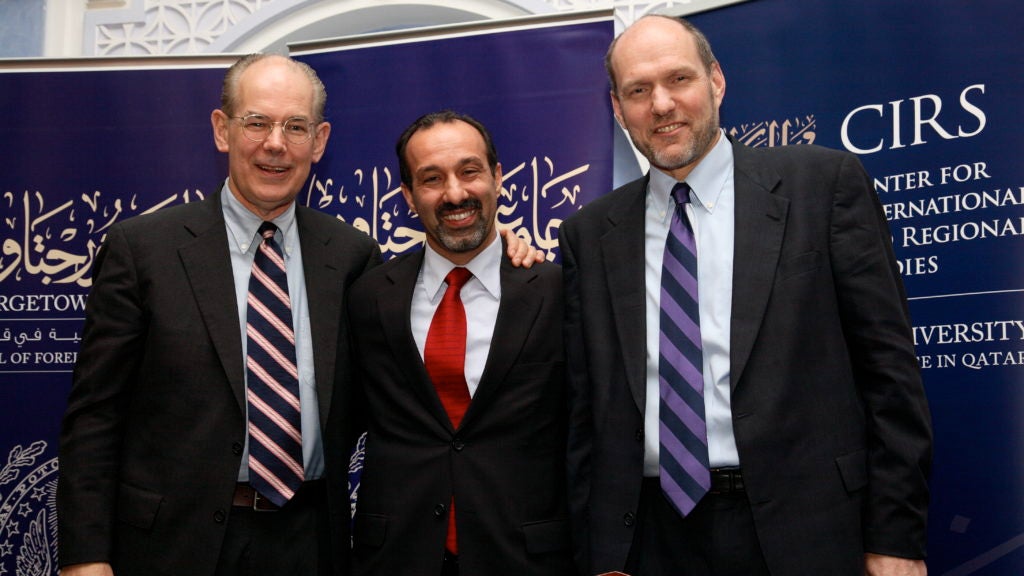Scholars discuss the Israel Lobby and US Foreign Policy

On Tuesday evening, June 17, 2008, the Center for International and Regional Studies at Georgetown’s Qatar Campus hosted a lecture on the impact of the Israel lobby and the US Foreign Policy on the countries concerned. The lecture discussed the findings of research conducted by John Mearsheimer and Stephen Walt and recently published in a book entitled “The Israel Lobby and US Foreign Policy.”The Israel Lobby and U.S. Foreign Policy was published in 2007 in the United States and is an elaboration of an article the two authors published in 2006 in the London Review of Books.In conducting the research, the professors sought to answer whether policies the US advocates on the behalf of the Israel lobby or the State of Israel are in the interest of the US, the Middle East or even Israel. Walt, Professor of International Relations at John F. Kennedy School of Government at Harvard University, argued that this issue should be discussed openly, and that it should not be overshadowed with accusations of anti-Semitism. He was quick to explain that both researchers reject all Zionist conspiracy theories.The authors explained that this special relationship between the US and Israel is a result of the political influence of the Israeli lobby in the US. He gave three different justifications for that relationship and presented explanations that refute them. The three justifications are that Israel is a vital strategic asset for the US, Israel is a fellow democracy and that American people are strongly pro-Israel.Walt clarified that, like any other interest group in he US, the Israel lobby impacts US policymaking. He explained how lobbies operate, and how the Israel lobby is particularly effective in working towards achieving its political goals. He highlighted that the Israel lobby is not centralized, rather it is a loose coalition of different organizations that do not necessarily agree on everything. For example, the two-state solution is a source of disagreement among some members of the Israel lobby. Walt also made a distinction between the Israel lobby and Jewish Americans. “Many Jewish Americans do not support the lobby, and some groups that do support the lobby are not Jewish,” he said.According to Walt, the Israel Lobby works in a number of different ways. One way is by ensuring that people sympathetic to the lobby, and Israel, are elected to office. “To be even remotely critical of Israel, would be costly to a US politician,” said Walt. The lobby also shapes public discourse in the US so that the public is more likely to support pro-Israel policy. This is clear mainly through the fact that the views expressed on American media about the Israeli policy are very narrow and rarely ever questioned. Walt cited the response to Jimmy Carter’s book “Palestine: Peace not Apartheid” as an example. Various groups published ads condemning the book and inviting readers to criticize the author. The lobby also withholds advertising money as a way to keep media outlets in line with the lobby’s politics. Consequently, media coverage is heavily slanted in Israel’s favor.According to Walt and Mearsheimer, the lobby’s influence is mainly because its critics are accused of being “anti-Semitic”. The fear of such accusation distracts people from the main issue, deters people from participating in this political debate and discourages people in the public and political arena from challenging the lobby’s influence.Mearsheimer, Professor of Political Science and the co-director of the Program on International Security Policy at the University of Chicago, took the analysis one step further and presented arguments on how US Foreign Policy does not represent America’s best interests. He argued that the lobby is the main reason for American favoritism towards Israel and US inability to pressure Israel to stop any of its undesirable acts, such as expanding settlements. Since Clinton’s presidency, the US has requested for Israel to stop building settlements. However, Israel has continued to expand its settlements and double the number of settlers. “Israel’s expansion of settlements is a result of its own domestic policy, and is not in the American interest,” explained Mearsheimer.The policies that the Lobby advocates for are not in America’s interest, much less, in the interest of Palestine and other Middle Eastern countries. According to Walt and Mearsheimer, American support for Israel’s treatment towards Palestinians angers people. This anger helps fuel terrorism and motivates individuals to attack the US, further generating sympathy and support for terrorism. The work of the 9/11 Commission shows that US support for Israel was a key reason for the attacks.Mearsheimer said that the Lobby’s policies would not be problematic if they were in the best interest of the US, but they are not.